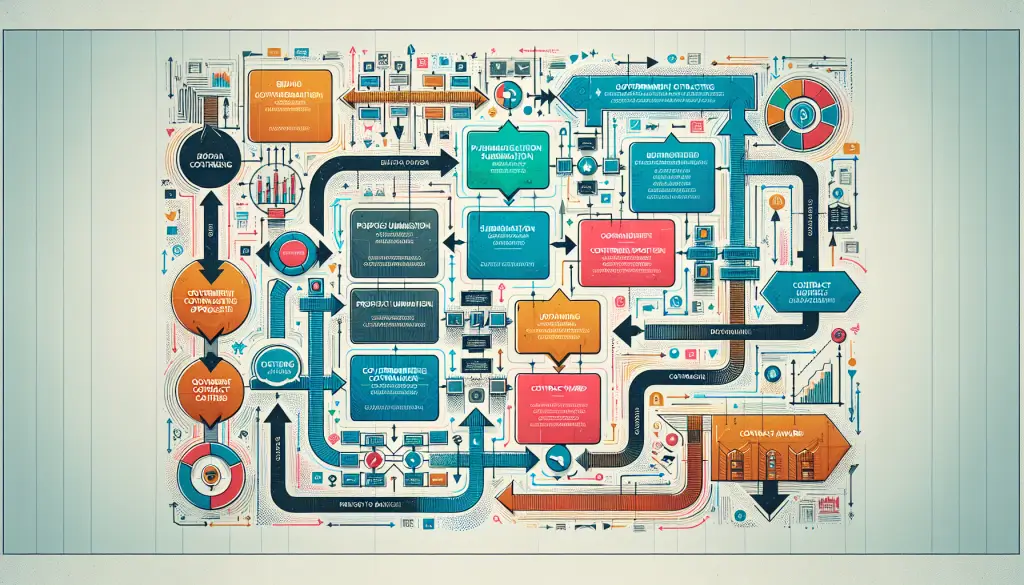15 Essential Construction Company Roles & Their Responsibilities
September 23, 2024
Government contractors execute and manage projects for government agencies, and you might wonder, what do government contractors do? They handle roles from construction to technical support, ensuring compliance and quality. This guide explores their responsibilities and the contracting process.
Navigating the realm of government contracting can present a complex yet fruitful endeavor. When it comes to opportunities for federal contracts valued over $25,000, they are openly announced to maintain transparency and foster competition among eligible contractors eager to enter the bidding process. Such openness not only creates opportunities but also calls for an in-depth comprehension of specific standards and rules that preside over these agreements.
In the sphere of government contracting, there’s room for companies across the spectrum—from larger entities contending for substantial federal projects down to smaller firms concentrating on local government contracts. Regardless of their size or scope, every contractor engaging with governmental bodies must be adept at handling intricate procedures and regulations that come with such undertakings while ensuring compliance and consistently delivering services that meet high-quality benchmarks.

Contractors serving the government play a pivotal role in numerous public initiatives, providing vital services and resources to an array of agencies. Contractors operating at the federal level are tasked with fulfilling all contractual commitments, implementing robust quality management systems, and meticulously recording each stage within the process.
Throughout a project’s duration, from its initial proposal through to its finalization, contractors engaged by the government must adhere to every applicable law and regulation. These contractors’ functions span various domains such as construction endeavors, security measures, and intricate technical assistance—highlighting their critical contribution towards accomplishing projects commissioned by the government efficiently.
Contractors engaged by the government are tasked with a range of duties crucial for the successful completion of public projects. Their role encompasses overseeing contract performance in its entirety, ensuring that standards for quality and compliance are consistently met through ongoing inspections and evaluations to confirm that products or services conform to stipulated requirements.
These contractors bear the responsibility of devising feasible strategies tailored to execute projects effectively. Such strategizing demands an in-depth comprehension of the needs specific to the government agency they serve, as well as a dedication to complying with all pertinent laws and regulations.
The hallmark of effective government contractors lies in their ability not only to juggle these stringent expectations but also to provide solutions driven by value throughout project delivery.

Understanding the process of federal procurement is essential for businesses aiming to acquire government contracts. Annually, the federal government distributes billions of dollars via these contracts, providing a substantial potential income source for contractors. This begins with pinpointing appropriate opportunities for contracts by conducting thorough research or responding to solicitations from the government.
Consultants who are seasoned in this field can provide significant assistance when it comes to maneuvering through this complex environment. They bring expert insight into trends related to procurement and assist companies throughout every stage of securing a contract, starting from initial research through to successful execution. Using professional networking platforms such as LinkedIn can be instrumental for contractors looking to build valuable relationships with influential individuals within various federal agencies.
Commencing the bid process for government contracts involves seeking out potential opportunities via numerous resources and meticulous research. Subsequently, contractors craft detailed proposals in response to either a request for proposals (RFP) or an invitation to bid (ITB). These submissions must articulate their strategies comprehensively for fulfilling governmental requirements, as this significantly increases their likelihood of securing the contract.
A thorough understanding of the bidding intricacies is crucial during this stage. Contractors are required to focus intently on meeting all specifications outlined in the RFP or ITB while customizing their bids accordingly. Such customization encompasses showcasing previous achievements and dependability alongside presenting a well-devised strategy aimed at successfully executing the terms of the contract.
Contractors are obligated to do more than just fulfill their contractual obligations. They must also strictly comply with all applicable laws and regulations. This demands a thorough comprehension of the regulatory landscape and an adeptness at managing the intricacies involved in adhering to these standards.
To align with government expectations, obtaining necessary security clearances and requisite certifications is frequently essential. To craft competitive proposals, potential bidders should conduct thorough research on both rival contractors and the unique requirements of the governmental body in question. Showcasing a track record of reliability and solid past performance is imperative for winning new contracts.

Contracts issued by the government are tailored to accommodate various project types and associated risks. Contractors can select from three primary contract forms: fixed-price, cost-reimbursement, and time-and-materials. Contractors must understand each type to align them with their skill set and the demands of a specific project.
With fixed-price contracts, there is financial stability as the cost is predetermined at the onset of the contract. Conversely, cost-reimbursement contracts offer contractors compensation that covers allowable expenses plus an additional fee. This arrangement is often advantageous for projects where costs cannot be accurately estimated in advance.
Lastly, time-and-materials contracts afford a level of adaptability since they compensate contractors based on both labor hours expended and materials utilized during a project’s completion.
Fixed-price contracts are favored for their ability to define a specific cost for goods or services, ensuring that both the government and the contractor can predict expenses. These agreements lock in a set price throughout the project’s lifespan, offering fiscal stability to government agencies.
Yet, it is the contractor who bears any additional costs beyond the agreed amount. It necessitates meticulous planning and effective management of resources to ensure that spending remains within established limits. When executed with precision, fixed-price contracts offer significant advantages to all involved parties despite their inherent risks.
Contracts based on cost-reimbursement compensate contractors for eligible expenses incurred while carrying out the project, to a supplementary fee representing their profit. Such contracts are ideal for endeavors where costs are not definite and the government agrees to shoulder a portion of the financial risks.
Flexibility is inherent in these contracts, as they allow adjustments regarding scope and unexpected costs. Contractors receive compensation for their expenditures, which diminishes their fiscal exposure, thereby facilitating more precise planning of the project.
Contracts based on time and materials compensate for the genuine cost of labor hours utilized and materials expended, affording adaptability. Such a contract is advantageous for projects with an unclear scope and duration that cannot be precisely established at their inception.
These contracts permit alterations to material costs and labor rates according to the real expenditures, which suits projects subject to fluctuating workloads well. Nevertheless, stringent oversight and meticulous record-keeping are necessary in these agreements to confirm that all charges are adequately documented and warranted.
Contractors serving government agencies operate within a unique framework that is characterized by numerous restrictions. These may pertain to budgetary, technical, statutory or regulatory aspects. For contractors aiming to execute successful projects that align with the stringent stipulations of the public sector, it’s vital to grasp these limitations.
To fulfill their role effectively and deliver outcomes that meet high standards while providing value, contractors must be capable of adjusting and devising creative approaches within the inflexible frameworks and regulations established by government bodies. Those who excel are adept at maneuvering through these challenges without compromising on quality or effectiveness.
Financial limitations within the public sector often present considerable obstacles for contractors working with the government. Changes in governmental funding can affect the economic footing of projects, potentially causing interruptions. Contractors must exercise prudent budget management, confirming they possess sufficient financial means to meet their contractual commitments.
In response to these fiscal restrictions, it frequently necessitates employing specialized accounting tools that facilitate easier control over budgets and ensure adherence to regulations. Through consistent fiscal evaluations and modifications, contractors can steer their projects according to plan while remaining fiscally responsible amidst economic uncertainty.
Management of technical limitations represents a considerable hurdle for contractors working with government agencies. These agencies often operate on legacy systems desperately in need of modernization. Addressing these technical restrictions means reducing technical debt and presenting cutting-edge alternatives to upgrade the existing infrastructure.
Working closely with IT chiefs from the agency side and prioritizing change management enables government contractors to tackle such technological obstacles successfully. By offering actionable solutions and aiding in the implementation of novel technologies, contractors can navigate past the impediments presented by antiquated systems.
In the realm of government contracting, it is essential for contractors to successfully maneuver through a complex web of laws and regulations. To comply with stringent procurement legislation, ethical guidelines, and labor norms, adherence is not optional but mandatory. For future contract eligibility consideration by the government, maintaining an exemplary record of past performance is fundamental for contractors to be recognized as reliable entities.
To align with contemporary regulatory shifts and safeguard confidential governmental data adequately, bolstering cybersecurity protocols has become imperative. Contractors are advised to remain vigilant regarding legal mandates while upholding rigorous ethical codes in order to adeptly traverse the intricate terrain of legislative stipulations in contracting practices.

Being a contractor for the federal government carries with it various perks, including substantial job security. Contractors benefit from steady employment since the federal government is a reliable entity that does not go out of business, thus ensuring consistent work opportunities. Typically, these government contracts are awarded for durations ranging from one to three years, which enhances this sense of stability.
In terms of compensation packages offered through government contracting jobs often come with competitive wages complemented by an extensive array of benefits such as health insurance coverage, retirement savings plans, and provisions for paid time off. These offerings frequently surpass those found within private sector roles making positions as a government contractor quite appealing.
Contractors engaged in work with the government have access to training programs and professional advancement opportunities. This aspect fosters both personal development and overall career fulfillment.
Deux Project Limited stands out as a model of successful engagement in government contracting. The company boasts proficiency in building an array of structures ranging from hospitals and schools to roads and stadiums, displaying its wide-ranging construction capabilities. Such adaptability empowers Deux Project Limited to tackle diverse projects for the government, reflecting their competency in fulfilling varied requirements.
The company is also adept at executing large-scale initiatives that necessitate specialized mechanical installations which are crucial for functional efficiency in constructed facilities. Among these critical systems are:
Through its attention to such detailed undertakings within the realm of construction project delivery, Deux Project Limited showcases extensive expertise that goes beyond mere structural development.
Deux Project Limited has engaged in a multitude of construction projects tailored for government clients. These endeavors encompass the creation of building and bridge foundations, as well as various forms of piles such as sheet, CFA, aluminum, precast, steel, and anchor. Their expertise extends to executing shoreline reinforcement work along with the erection of cofferdams. The breadth of Deux Project Limited’s experience highlights its proficiency in managing an array of intricate construction assignments.
Showcasing their adaptability across varying types of ventures are developments like office structures, retail complexes, and manufacturing facilities that Deux Project Limited has completed. Their portfolio indicates not only versatility but also exemplifies their capacity to conform to assorted building specifications while consistently delivering top-tier outcomes.
Deux Project Limited excels in the implementation of specialized systems, with a focus on providing HVAC solutions that cater to government facilities. These customized heating and cooling systems adhere to rigorous energy standards while delivering dependable results.
To their HVAC services, Deux Project Limited offers the installation of sophisticated fire protection systems for government structures, featuring cutting-edge detection and suppression capabilities.
This company is skilled at crafting electrical setups optimized for both efficiency and reliability. It also expertly installs piping networks designed to transport water, gas, chemicals, and various fluids by established industry regulations.
To embark on the path of a government contractor, one must first complete vendor registration. The specifics of this procedure differ from state to state. Contractors are required to formally register their business and delve into research concerning current invitations for bids on contracts offered by the government. Agencies within the government are known to actively foster small businesses by providing direction and help as these businesses navigate through the intricacies of acquiring government contracts.
Grasping each detail about requisites and methodologies is paramount for successful participation in bidding processes. Contractors should acquaint themselves with federal acquisition regulations alongside locating appropriate contracting opportunities that align with their business offerings.
Businesses aiming to become government contractors are required to fulfill certain qualifications. Among these, certifications from Small Business Administration (SBA) programs are particularly vital for small businesses, as they facilitate access to government contracts and offer a distinct advantage during the competitive bidding process.
Those looking to secure contracts with the government need relevant experience within their industry and adequate technical expertise. An in-depth comprehension of federal regulations paired with a robust history of past performance stands out as an essential criterion for attaining government contracts.
Becoming a government contractor necessitates undergoing essential certification processes. To qualify for federal contracts, contractors must enlist their business with the System for Award Management (SAM), which entails meeting certain certification criteria to confirm eligibility.
By securing these certifications, a contractor’s trustworthiness is bolstered and their prospects of securing government contracts are elevated. Ensuring adherence to all regulatory mandates by regularly updating and complying with certification management procedures is crucial.
In the realm of government contracting, seasoned consultants play a vital role. Their specialized knowledge aids in mastering regulatory complexities and tackling project-related hurdles. Government contractors who engage with these knowledgeable advisors can boost their proficiency and guarantee the triumphant fulfillment of their contracts.
These expert consultants deliver strategies rooted in value, playing an instrumental role in advancing the achievements of projects undertaken by the government. Leveraging insights gained from previous work experiences, they equip contractors with tools to satisfy client requirements and surpass anticipated standards for contracting assignments.
Experts in government contracting, who frequently possess credentials such as the Federal Acquisition Certification in Contracting (FAC-C), provide invaluable proficiency. These certifications confirm that consultants adhere to federal norms for acquisition and contracting processes, augmenting their qualifications.
These skilled consultants are instrumental in guiding contractors through the intricate maze of governmental regulations with efficiency. Their familiarity with historical projects and proven strategies is crucial for the triumphant fulfillment of contracts.
Expert consultants assist contractors working with government entities by providing specialized solutions for intricate needs. They bolster the management of contracts and boost project results via customized strategies.
To offer these tailored solutions, consultants aid government contractors in raising their profile and establishing connections with governmental bodies through active participation at industry events and effective utilization of social media channels. Such activities can foster significant partnerships and open doors to fresh opportunities.

To excel in government contracting, businesses must adopt solid strategies that encompass budget management and the cultivation of robust client relationships. New openings for contractors have emerged as a result of fresh federal spending legislation, encouraging an increased number of businesses to engage with government projects.
Working alongside seasoned consultants can elevate project results and bolster efficiency. Concentrating on essential business operations while navigating intricate requirements is crucial for contractors aiming to accomplish successful project completion and fulfill client expectations.
Navigating the challenges of variable budgets necessitates proficient budget management. Contractors need to retain financial adaptability to adjust to shifting economic climates and secure the successful completion of their projects.
By consistently tracking actual spending against set budgets, contractors can spot expenditure patterns and maintain compliance with fiscal protocols. Implementing such budgetary measures empowers them to handle monetary limitations efficiently and accomplish project objectives.
Forging robust connections with clients is critical for triumph in government contracting. It’s vital to comprehend the distinct requirements of government agencies and cater to them by actively engaging and customizing solutions accordingly. Solidifying trust through regular interaction bolsters relationships within the realm of government contracting.
Concentrating on client fulfillment and sustaining transparent dialogue assists contractors in creating enduring alliances, thereby securing the success of their projects with government agencies.
The main types of government contracts include fixed-price, cost-reimbursement, and time-and-materials contracts. Each type serves specific project needs and funding structures.
To serve as a contractor for the government, your business needs to be properly registered and fulfill all mandatory certification criteria, which includes registering with the System for Award Management (SAM).
You must confirm whether your company meets the requirements to be considered a small business, if relevant.
Being employed as a contractor by the government comes with the advantages of stable employment, attractive wages, and extensive benefits. It also provides opportunities for training and career advancement.
Such elements provide compelling reasons for those pondering a profession in this area to pursue it actively.
It is essential to engage consultants with expertise in government contracting, as they bring critical knowledge for handling intricate regulatory frameworks and overcoming challenges associated with projects adeptly.
Their input significantly bolsters the prospects for achieving successful execution of a contract.
To succeed in government contracting, focus on effective budget management, cultivate strong client relationships, and stay informed about federal procurement policies.
Implementing these strategies will significantly enhance your chances of success.
September 23, 2024
September 18, 2024
August 26, 2024